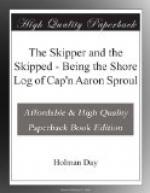She advanced on him, forefinger upraised.
“Before you go to spreadin’ sail, marm,” said the Cap’n, stoutly, “you’d better be sure that you ain’t got holt of the down-haul instead of the toppin’-lift.”
“Talk United States, Cap’n Sproul,” snapped Miss Nile. “You’ve had your money in this pit of perdition here, you and Hiram Look, the two of you. As a town officer you’ve let Ferd Parrott fun a cheap, nasty rum-hole, corruptin’ and ruinin’ the manhood of Smyrna, and you’ve helped cover up this devilishness, though we, the wimmen of this town, have begged and implored on bended knee. Now, that’s plain, straight Yankee language, and we want an answer in the same tongue.”
Neither the Cap’n nor Hiram found any consolation at that moment in the countenances of their respective wives. Those faces were very red, but their owners looked away resolutely and were plainly animated by a stern sense of duty, bulwarked as they were by the Workers.
“We’ve risen for the honor of this town,” continued Miss Nile.
“Well, stay up, then!” snorted the short-tempered Hiram. “Though as for me, I never could see anything very handsome in a hen tryin’ to fly.”
“Do you hear that?” shrilled Miss Nile. “Aren’t you proud of your noble husband, Mis’ Look? Isn’t he a credit to the home and an ornament to his native land?”
But Hiram, when indignant, was never abashed.
“Wimmen,” said he, “has their duties to perform and their place to fill—all except old maids that make a specialty of ’tending to other folks’ business.” He bent a withering look on Miss Nile. “Cap’n Sproul and me ain’t rummies, and you can’t make it out so, not even if you stand here and talk till you spit feathers. We’ve had business dealin’s with Parrott, and business is business.”
“And every grafter ’twixt here and kingdom come has had the same excuse,” declared the valiant head of the Workers. “Business or no business, Ferd Parrott is done runnin’ this tavern.”
“There’s a point I reckon you and me can agree on,” said Hiram, sadly. He gazed out to where the tracks of Mr. Parrott led away through the slush.
“And it’s the sense of the women of this place that such a dirty old ranch sha’n’t disgrace Smyrna any longer.”
“You mean—”
“I mean shut up these doors—nail ’em—and let decent and respectable women put up the folks who pass this way—put ’em up in a decent and respectable place. That’s the sense of the women.”
“And it’s about as much sense as wimmen show when they get out of their trodden path,” cried Hiram, angrily. “You and the rest of ye think, do ye, that me and Cap’n Sproul is goin’ to make a present of five thousand dollars to have this tavern stand here as a Double-yer T. Double-yer monnyment? Well, as old Bassett said, skursely, and not even as much as that!”
“Then I’d like to see the man that can run it,” declared the spokeswoman with fine spirit. “We’re going to back Mis’ Gifford. We’re going to the train to get custom for her. We’re going to warn every one against this tavern. There isn’t a girl or woman in twenty towns around here who’ll work in this hole after we’ve warned ’em what it is. Yes, sir, I’d like to see the man that can run it!”




